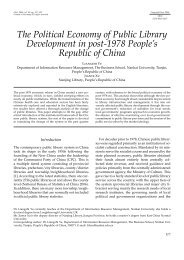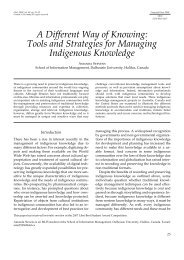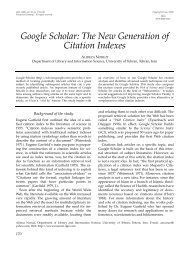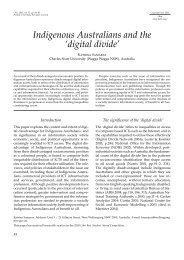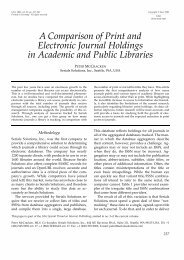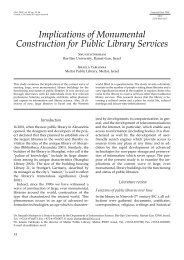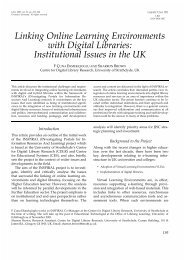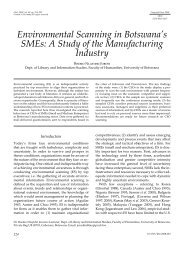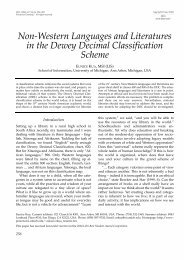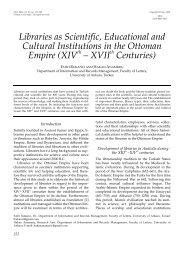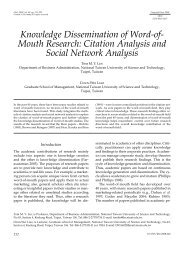IFLA/UNESCO School Library Manifesto for Creating One World - Libri
IFLA/UNESCO School Library Manifesto for Creating One World - Libri
IFLA/UNESCO School Library Manifesto for Creating One World - Libri
Create successful ePaper yourself
Turn your PDF publications into a flip-book with our unique Google optimized e-Paper software.
<strong>Libri</strong>, 2009, vol. 59, pp. 45 – 54<br />
Printed in Germany, All rights reserved<br />
<strong>IFLA</strong>/<strong>UNESCO</strong> <strong>School</strong> <strong>Library</strong> <strong>Manifesto</strong><br />
<strong>for</strong> <strong>Creating</strong> <strong>One</strong> <strong>World</strong><br />
Germany, Iran and Turkey in Comparative Perspective<br />
H. INCI ÖNAL<br />
Department of In<strong>for</strong>mation Management, Faculty of Letters, Hacettepe University, Ankara, Turkey<br />
<strong>School</strong> libraries are indispensable adjuncts to education, a base<br />
<strong>for</strong> generating innovative thinking, a stimulus to culture, and an<br />
aid to individual self–development. The <strong>IFLA</strong>/<strong>UNESCO</strong> <strong>School</strong><br />
<strong>Library</strong> <strong>Manifesto</strong>, the qualitative standard <strong>for</strong> universal provision,<br />
recommends that <strong>for</strong> each country there should be work on<br />
developing links between the school’s objectives and its library’s<br />
service. The <strong>Manifesto</strong> strongly endorses the creation of strong<br />
and effective school libraries. The national school library systems<br />
in Germany, Iran and Turkey have provided in<strong>for</strong>mation services<br />
over the years, yet inadequate study to evaluate these services<br />
has limited understanding of the effects of the <strong>Manifesto</strong>. This<br />
study examined the impact of the <strong>Manifesto</strong> through literature<br />
Introduction<br />
The first library standard as a report <strong>for</strong> schools of<br />
different sizes in the United States was set in 1915 by<br />
the Committee on <strong>Library</strong> Organization and Equipment<br />
(CLOE) within the Department of Secondary<br />
Education of the National Education Association<br />
(NEA). This landmark report was adopted by the<br />
NEA in 1918 and later by the American <strong>Library</strong><br />
Association (ALA) in 1920. The influence of the<br />
school library programs which were developed and<br />
published in the 1960s by the ALA and American<br />
Association of <strong>School</strong> Librarians (AASL) was seen<br />
in national standards, guidelines and policies in the<br />
United States and Western Europe. Generally,<br />
however, every country developed and documented<br />
its own standards, reflecting differences in the<br />
provision of school library services not only between<br />
countries, but also within a country. Governments’<br />
interest, political considerations, the structure<br />
of education systems, varying cultural values,<br />
Copyright Saur 2009<br />
<strong>Libri</strong><br />
ISSN 0024-2267<br />
analysis, visiting 425 school libraries in these countries and/or<br />
using their websites, interviews with 1107 individuals, and a<br />
summative comparative evaluation. The results reveal that the<br />
national implementations of the <strong>Manifesto</strong>, its statements on<br />
objectives and duties, are a valuable support to ongoing<br />
processes of policy <strong>for</strong>mulation. The study also shows evaluations<br />
from the librarians’own perspectives, and uncovers general<br />
suggestions <strong>for</strong> more efficient and effective solutions. The<br />
comparisons completed in 2008 reveal important in<strong>for</strong>mation<br />
about the impact of the <strong>Manifesto</strong> in school library services, and<br />
enable recommendations to be made <strong>for</strong> the future use and<br />
development of the <strong>Manifesto</strong>.<br />
and professional programs influenced the preparation<br />
of documents at national levels. Since 1990,<br />
various internationals organisations such as, the<br />
International Association of <strong>School</strong> Librarianship<br />
(IASL), the International Book Committee (IBC), the<br />
International Federation of <strong>Library</strong> Associations<br />
and Institutions (<strong>IFLA</strong>) and <strong>UNESCO</strong> have wanted<br />
to prepare international principles <strong>for</strong> common use.<br />
The principles of the <strong>School</strong> <strong>Library</strong> <strong>Manifesto</strong> were<br />
developed by <strong>IFLA</strong> in consultation with the <strong>IFLA</strong><br />
Section on <strong>School</strong> Libraries and Resource Centres<br />
and IASL, and subsequently endorsed by<br />
<strong>UNESCO</strong>. The <strong>Manifesto</strong> (which was endorsed at<br />
the IASL Annual General Meeting in August 2002)<br />
was prepared in 1998, published in 1999 and<br />
adopted by <strong>IFLA</strong> Section on <strong>School</strong> Libraries and<br />
Resource Centres, <strong>UNESCO</strong> and IASL in 2000. It<br />
was designed to provide a guide <strong>for</strong> the evaluation<br />
of libraries which emphasizes general criteria, such<br />
as: the mission, funding, legislation and networks,<br />
goals, staff, operation and management, imple-<br />
Dr. H. Inci Önal is Associate Professor in the Department of In<strong>for</strong>mation Management, Faculty of Letters, Hacettepe University, 06800<br />
Beytepe, Ankara, Turkey, Tel : +90 (312) 297 82 00, Fax: +90 (312) 299 20 14. E-mail: onal@hacettepe.edu.tr<br />
DOI: 10.1515/libr.2009.005 45
H. Inci Önal<br />
menting the principles of the <strong>Manifesto</strong>. It is an<br />
important international statement of principles of<br />
service and it is sufficiently broad to be applicable to<br />
almost every school library service in any country of<br />
the world. It is now freely available in its entirety in<br />
a constantly increasing number of languages (currently<br />
more than 35 languages) on the <strong>IFLA</strong> website<br />
(http://www.ifla.org/VII/s11/pubs/schoolmanif.<br />
htm).<br />
Following the publication of the 1999 edition of<br />
the <strong>Manifesto</strong>, the <strong>IFLA</strong>/<strong>UNESCO</strong> <strong>School</strong> <strong>Library</strong><br />
Guidelines gives a new direction <strong>for</strong> the development<br />
of libraries, particularly in recognizing their<br />
fundamental mission and improving their legal<br />
framework. The Guidelines are also available <strong>for</strong><br />
free downloading in a variety of languages from the<br />
<strong>IFLA</strong> website (http://www.ifla.org/VII/s11/pubs/<br />
sguide02.pdf). To evaluate national standards or<br />
criteria (guidelines, recommendations, regulations,<br />
specific policies) against the <strong>IFLA</strong>/<strong>UNESCO</strong> <strong>School</strong><br />
<strong>Library</strong> <strong>Manifesto</strong> becomes crucial <strong>for</strong> stimulating<br />
and planning ongoing and continuous development.<br />
Literature review<br />
The literature was searched extensively prior to<br />
undertaking the survey, and several documents<br />
relevant to school library policies, standards and<br />
guidelines were found (Lowrie 1972; Carroll 1981;<br />
Lowrie and Nagakura 1991; Singh 1993; Galler<br />
1996; Barrett and Brown 2004; FEBAB and <strong>IFLA</strong><br />
2005). Bernhard (1997) prepared a book including<br />
publications, papers, articles, guidelines, policies,<br />
laws, reports, association lists, and programs relevant<br />
to school libraries from 63 countries. Only this<br />
book includes in<strong>for</strong>mation concerning Germany,<br />
Iran and Turkey. Specifically, there are no up–to–date<br />
comparative analyses which identify the<br />
differences and similarities in attitudes toward<br />
using standards and the <strong>Manifesto</strong> among school<br />
libraries in these countries.<br />
The research – Aims and objectives<br />
The purpose of this research is to find out important<br />
in<strong>for</strong>mation about the impact of <strong>IFLA</strong>/<strong>UNESCO</strong><br />
<strong>School</strong> <strong>Library</strong> <strong>Manifesto</strong> in school library services.<br />
The aim is to contribute to ef<strong>for</strong>ts in progress, by<br />
providing concrete evidence of school library<br />
46<br />
policies and collecting in<strong>for</strong>mation on the important<br />
role such policies could play.<br />
The objectives of the research are identified as<br />
follows:<br />
• Define and summarize the components of the current<br />
standards <strong>for</strong> the school library services in Germany, Iran<br />
and Turkey, applied in 2006–2008;<br />
• Make an evaluation of the impact of the <strong>Manifesto</strong>;<br />
• As regards the national profiling of the standards an attempt<br />
is made to:<br />
• Examine their impact on society;<br />
• Evaluate findings;<br />
• Finally an attempt is made to generalize factors contributing<br />
to the development and successful promotion of libraries.<br />
Methodology<br />
Problems in library development are caused by a<br />
combination of factors, and these factors have to be<br />
examined in the context of librarianship, of education<br />
and of social and cultural background in a<br />
comparative problem study (Simsova 1982; Crossley<br />
and Watson 2004). Comparison of library<br />
services in different countries offers opportunities<br />
<strong>for</strong> identifying common ground while distinguishing<br />
differences, as well as <strong>for</strong> assimilating what is<br />
useful and discarding what is not. Although it is<br />
impossible to give a comprehensive coverage of all<br />
countries, this research provides an assessment of<br />
some recent developments that have taken place as<br />
part of a worldwide trend. By using the comparative<br />
method, it is possible to understand what is<br />
important as a vehicle <strong>for</strong> learning from others’<br />
strengths, to minimize weaknesses, and to further<br />
international understanding.<br />
This research article has been developed on the<br />
basis of the <strong>Manifesto</strong> by making a comparative<br />
study of school libraries in three very different<br />
countries: Germany, Iran and Turkey. The situation<br />
in each of the three countries is dealt with separately<br />
(in alphabetical order). Sharing experiences across<br />
countries will enable these countries and others to<br />
learn from each other.<br />
Population<br />
In order to receive original, new and comprehensive<br />
data and in<strong>for</strong>mation, the population <strong>for</strong> this study<br />
included school libraries, branch libraries within a<br />
school centre, school library service centres, media<br />
centres from Germany, Iran and Turkey. The con-
cept of school librarianship is certainly not new <strong>for</strong><br />
these countries. Despite very different social systems,<br />
levels of economic development, geographic<br />
locations, educational systems and cultural backgrounds,<br />
the three countries have much in common<br />
in the application of modern librarianship techniques.<br />
In reality, however, the school libraries in<br />
these countries, as a group, are the least developed<br />
of all their libraries.<br />
Sample<br />
Bonn, Cologne, Dortmund, Frankfurt am Main,<br />
Munich, and Oberhausen, Germany; Tabriz, Tehran,<br />
and Zanjan, Iran; and Ankara, Istanbul, and<br />
Izmir, Turkey, were selected randomly as the foci <strong>for</strong><br />
the study. The data and in<strong>for</strong>mation related to the<br />
research were derived using random sampling<br />
procedures and these data have been collected,<br />
since March 2004, from different sources such as the<br />
literature, national standards and reports, the main<br />
library’s home page, structured interviews, and<br />
email correspondence.<br />
The study focused on the school library systems.<br />
The standards and reports related to these systems<br />
and the <strong>Manifesto</strong> as an international qualitative<br />
standard were reviewed as the primary purposes of<br />
these documents are to provide a framework <strong>for</strong> the<br />
ongoing professional applications in the development<br />
of library services. A sample of all types of<br />
school libraries was drawn from each of these three<br />
countries. These included all the main school library<br />
services in Germany, all the reachable school<br />
libraries in Iran, and the best 190 school libraries<br />
on the Turkish Ministry National Education list. In<br />
total, 425 school libraries were visited and/or their<br />
websites were accessed, including: 43 libraries and<br />
81 websites from Germany; 37 libraries and 74<br />
websites from Iran; 87 libraries and 103 websites<br />
from Turkey. At first, structured interviews with the<br />
authorities, librarians, teachers and volunteers were<br />
undertaken at those school libraries and national or<br />
regional departments that were personally visited.<br />
In addition, librarians’ e-mail addresses were identified<br />
from libraries’ websites, using search engines<br />
or directories. Structured interviews were conducted<br />
with these librarians through e-mail correspondence.<br />
A total of 1107 individuals responded to this<br />
survey and each school was represented by one to<br />
five individual respondents. This study allowed <strong>for</strong><br />
more than one response, but the most frequent of<br />
<strong>IFLA</strong>/<strong>UNESCO</strong> <strong>School</strong> <strong>Library</strong> <strong>Manifesto</strong> <strong>for</strong> <strong>Creating</strong> <strong>One</strong> <strong>World</strong><br />
responses to each interview question identified<br />
each library<br />
Between February 2006 and April 2008, 167<br />
libraries in the above 12 cities were personally<br />
visited, 258 library websites in the three countries<br />
were accessed, and more than 2500 e-mail communications<br />
were undertaken to identify in<strong>for</strong>mation<br />
about standards, the <strong>Manifesto</strong> and evaluations<br />
from the librarians’ own perspectives. Systems,<br />
standards and the use of the <strong>Manifesto</strong> are compared;<br />
one object is compared with another, one<br />
country with another, and so on.<br />
Comparisons<br />
Aspects that received attention are the environment,<br />
establishment, governance, and the basic<br />
involvement of the three library systems. A summary<br />
of these aspects is provided in Table 1.<br />
When comparing the three systems, it becomes<br />
clear that each has its own strengths and weaknesses.<br />
The German school library system is relatively welldeveloped<br />
in certain areas such as collections,<br />
services and cooperation, and ef<strong>for</strong>ts have been<br />
made since the early 2000s to address previous<br />
inadequacies in integration of library provision with<br />
education systems (Baumert and et al. 2001; Bertelsmann<br />
Stiftung and NRW 2004; Dankert 2004).<br />
Similarly, the beginnings of a move towards more<br />
resource-based teaching and learning in schools with<br />
libraries supporting the curriculum with a range of<br />
materials are a particularly significant aspect of<br />
developments in Iran. The weakness of Iranian<br />
school libraries lies in the fact that services have<br />
been adapted to the complicated bureaucratic system<br />
and lack of co-operation. As part of the process<br />
of empowerment, equipment not normally available<br />
in school libraries <strong>for</strong> student use, like computers,<br />
printers and some media resources, are made<br />
available to patrons to enable them to produce<br />
their own materials (Jovkar and Kinnell 1993; Sazeman<br />
Amozesh Pervash Otsan Zanjan 2004). Every<br />
school has a library in Turkey. This emphasizes that<br />
the strengths are resources and equipment. The<br />
Turkish school library is near to its users. Overall,<br />
both principals and school librarians agreed that the<br />
existence of a school library was important (Önal<br />
2005). The biggest weakness of the Turkish school<br />
library system is that it is not addressing the real<br />
needs of the educational environments it is serving,<br />
neither through active participation in user–centred<br />
47
H. Inci Önal<br />
Table 1. Comparative table: school library systems<br />
Components Germany Iran Turkey<br />
Environment Western European country Middle Eastern and West European and Middle Eastern<br />
with a high income economy Asian country with lower country with upper middle<br />
middle<br />
income economy<br />
income economy<br />
Establishment By request of school and the<br />
Federal Government<br />
Governance Governed by local and regional<br />
authorities;<br />
Contact with school library<br />
service centers<br />
Aims To provide learner – centered<br />
education<br />
Finance Financed by the Federal<br />
Government;<br />
Sponsorship from private<br />
organisations<br />
Staff Librarians, teachers, school<br />
administrative staff, voluntary<br />
helpers<br />
services, nor in the kinds of services considered an<br />
integral part of the education system (Önal 1995,<br />
Official actions since 1966 and<br />
the Islamic Revolution of 1979<br />
Requirements <strong>for</strong> <strong>School</strong> Libraries<br />
Bylaw since 1959<br />
The Ministry of Education The Ministry of National<br />
Education<br />
To select, collect, describe,<br />
store, and manage<br />
in<strong>for</strong>mation<br />
Financed by the Ministry of<br />
Education;<br />
The assistance of the<br />
Supreme Council of<br />
Education, and the<br />
General Offices of Education<br />
Teachers and staff with<br />
appropriate training<br />
To develop quality programs and<br />
services<br />
Financed by the Ministry of<br />
National Education;<br />
Sponsorship from private<br />
organisations;<br />
Donations by national and/or<br />
international organisations<br />
Librarians, teachers and nonprofessional<br />
staff<br />
Collection Rich and updated Basic research and recreation Basic research and recreation<br />
Types of<br />
media<br />
Print <strong>for</strong>mats, audiovisual<br />
materials, electronic resources<br />
and environments<br />
Print <strong>for</strong>mats, audiovisual<br />
materials, electronic resources<br />
and environments<br />
Users Can charge membership fee Serves whole school free of<br />
charge<br />
Services In<strong>for</strong>mation services;<br />
Audio-visual services;<br />
Media presentations in teaching;<br />
Reading development programs<br />
Cooperation Cooperation between the city<br />
library and media center;<br />
Contact with local public libraries<br />
and branch libraries;<br />
Using media boxes<br />
48<br />
Cultural, educational and<br />
recreational services<br />
Cooperation between local<br />
public libraries and schools<br />
Print <strong>for</strong>mats, audiovisual<br />
materials, electronic resources<br />
and environments<br />
Serves whole school free of<br />
charge<br />
Curriculum based in<strong>for</strong>mation<br />
services;<br />
In<strong>for</strong>mation literacy teaching units<br />
Sharing of resources between<br />
different organizations common<br />
feature<br />
2005; Türkiye Cumhuriyeti Milli Eg˘itim Bakanligi<br />
2007).
Table 2. Standards <strong>for</strong> the school library services<br />
Standards Used Germany Iran Turkey<br />
Documents No specific<br />
Standards and Standards and Bylaw<br />
nation–wide norms guidelines<br />
Types Guidelines,<br />
Regulations,<br />
Recommendations<br />
Policy Use facilities,<br />
In<strong>for</strong>mation access,<br />
Reading improvement,<br />
In<strong>for</strong>mation & inquiry<br />
Cataloguing Regeln für die alphabetische<br />
Katalogisierung – RAK<br />
Classification Dewey Decimal<br />
Classification – DDC<br />
Standards and implementations<br />
An examination of the sample of libraries in these<br />
three countries revealed that none of the libraries in<br />
Germany made reference to standards or documents<br />
<strong>for</strong> services on their websites, although<br />
guidelines, regulations and recommendations are<br />
found in official documents. The Iranian libraries<br />
mentioned it on 60 percent of their websites, and the<br />
Turkish libraries mentioned it on 95 percent of their<br />
websites. The most likely explanation <strong>for</strong> this relies<br />
on cultural differences among Germany, Iran and<br />
Turkey. In Germany, if the libraries have documents<br />
or laws <strong>for</strong> services, everybody will be expected to<br />
follow the rules under all conditions and to “play by<br />
the rules”. A possible explanation is based on the<br />
tendency <strong>for</strong> people to disobey the regulations or<br />
standards in Iran and Turkey, attributed to the lack<br />
of supply of regulation and lack of demand <strong>for</strong><br />
regulation or laws.<br />
Standard documents,<br />
Content standards,<br />
Specify policies<br />
Use facilities,<br />
Teaching & learning,<br />
Collection<br />
development,<br />
In<strong>for</strong>mation & inquiry,<br />
Encouraging reading<br />
Anglo American<br />
Cataloging Rules –<br />
AACR2<br />
Dewey Decimal<br />
Classification – DDC<br />
Implementation Local and regional Local and regional National<br />
In<strong>for</strong>mation<br />
networks<br />
Networks<br />
targets<br />
Schulen ans Nets<br />
[<strong>School</strong>s on the Net]<br />
All schools connected to<br />
Internet by 2001<br />
<strong>IFLA</strong>/<strong>UNESCO</strong> <strong>School</strong> <strong>Library</strong> <strong>Manifesto</strong> <strong>for</strong> <strong>Creating</strong> <strong>One</strong> <strong>World</strong><br />
Roshd Network<br />
[<strong>School</strong>s Network]<br />
All schools connected to<br />
Internet by 2000<br />
National standards,<br />
Technology standards<br />
Use facilities,<br />
Technology& Internet,<br />
Programs administration,<br />
In<strong>for</strong>mation & inquiry,<br />
Encouraging reading<br />
Anglo American Cataloging Rules – AACR2<br />
Dewey Decimal Classification – DDC<br />
Bilgiye Eris¸im Portali<br />
[Global Gateway]<br />
All schools connected to Internet and<br />
development of Global Gateway by 2005<br />
While standards <strong>for</strong> the services provide guidelines,<br />
the librarians need to be in<strong>for</strong>med, educated<br />
and made aware of the national and international<br />
standards to develop their behaviours and policies.<br />
Standards related to specific areas <strong>for</strong> each of these<br />
countries are presented in Table 2.<br />
Libraries in Germany generally follow local and<br />
regional guidelines or rules as standards. They are<br />
specific, though sometimes not very helpful <strong>for</strong><br />
nationwide use. The <strong>Manifesto</strong> has been recommended,<br />
even though it still was not accepted<br />
everywhere. The <strong>Manifesto</strong> presents a coherent<br />
vision that specifies the particular values and beliefs<br />
that guide policy and practice within the school<br />
library program (Dahm 2005; Lux 2002; Seefeldt<br />
and Syré 2003, 86). Since 1996, a German educational<br />
Internet has been coordinated under the<br />
Schulen ans Netz [<strong>School</strong>s on the Net] initiative,<br />
which is a joint program between the Federal<br />
Ministry of Education, Science, Research and Tech-<br />
49
H. Inci Önal<br />
nology and Deutsche Telecom. Aside from developing<br />
an overall technological infrastructure <strong>for</strong><br />
schools the Schulen ans Netz also focuses on<br />
providing a consulting network <strong>for</strong> schools, a<br />
program of teacher training, and fosters cooperation<br />
between schools, universities, libraries and<br />
companies (Bundesministerium für Bildung und<br />
Forschung 2007; Flemming 2003).<br />
Iranian librarians are aware of the need to<br />
monitor their services against standards but sometimes<br />
have difficulties putting this into nationwide<br />
action. Several specific standards and guidelines are<br />
published in Iranian professional and research<br />
literature (Alivand 1998; Tavoni and Asefi 1998;<br />
Mejidi 1999; Mir Hüseyni 1999; Hanafi 2002).<br />
Usually those deal only with one library type such<br />
as elementary or secondary school libraries and<br />
with user groups who tend to value existing library<br />
services highly. What is needed, and <strong>for</strong> some time<br />
has been under consideration by the Ministry of<br />
Education, is a wide-scale and representative national<br />
survey of Iranian society attitudes towards<br />
school library services. Originating from the National<br />
In<strong>for</strong>mation Technology plan issued in 2000,<br />
Iran has been working towards the proposed<br />
extensive centralized “<strong>School</strong>s National Network”<br />
designed to establish an “in<strong>for</strong>mation network”.<br />
This <strong>for</strong>ms part of the planned integration of<br />
in<strong>for</strong>mation technology into major sectors, namely:<br />
government, education, leisure, publishing and<br />
media (The Islamic Republic of Iran 2007).<br />
Turkish libraries have a long experience of<br />
preparing standards from the beginning of the<br />
twentieth century and these standards are the basis<br />
of all assessments of library per<strong>for</strong>mance in the<br />
country. The Ministry of National Education, the<br />
main coordinating body <strong>for</strong> librarianship in Turkey,<br />
requires annual reports from all libraries. The<br />
task of collecting data is delegated to the <strong>School</strong><br />
Libraries Branch created within the Department of<br />
Publications. It also has an obligation, along with<br />
the Turkish Statistical Institute, to prepare and<br />
implement standards in the field of in<strong>for</strong>mation,<br />
documentation and archives. Among them was the<br />
first school libraries bylaw in 1959 (Türkiye Cumhuriyeti<br />
Maarif Vekaleti 1959), which was revised<br />
in 1976 (Türkiye Cumhuriyeti Milli Eg˘ itim Bakanligi<br />
1976) and revised again in 2001 (Türkiye<br />
Cumhuriyeti Milli Eg˘ itim Bakanligi 2001). The<br />
recent bylaw and the principles of the <strong>Manifesto</strong><br />
constitute the basis <strong>for</strong> Turkish Standards <strong>for</strong><br />
50<br />
<strong>School</strong> Libraries (Türkiye Cumhuriyeti Milli Eg˘ itim<br />
Bakanligi 2006). This provides descriptions of<br />
activities and statistical data <strong>for</strong> the school library<br />
network. The Ministry of National Education is<br />
charged with research and development into<br />
“cyber-in<strong>for</strong>mation services” and the operation<br />
and expansion of Global Gateway, a nationwide<br />
education in<strong>for</strong>mation system (Türkiye Cumhuriyeti<br />
Milli Eg˘ itim Bakanligi 2007, 110–116). Alongside<br />
this body the Turkish government also established<br />
the Turkish Research In<strong>for</strong>mation Centre.<br />
Table 3 presents evaluations from the librarians’<br />
own perspectives. Evaluation areas are:<br />
• Awareness – understanding of the aims, roles and responsibilities<br />
which the <strong>Manifesto</strong> indicates as important in<br />
developing an effective program. This involves both physical<br />
and intellectual perspectives. It shows when librarians<br />
became knowledgeable about the <strong>Manifesto</strong>.<br />
• Use – presents a broad vision can be positive or negative. It is<br />
important to use and refer to the <strong>Manifesto</strong> in many different<br />
contexts. The earlier experiences was summarized with the<br />
librarians’ view about how useful has the <strong>Manifesto</strong> been in<br />
helping them.<br />
• Expectation – results here give an indication of how librarians<br />
convert their ideas related to the <strong>Manifesto</strong> into practical<br />
action.<br />
• Future plans – which looks at action plans, changing the way<br />
the service was delivered, and promoting diversity. Librarians’<br />
future plans describe how to interpret the themes of the<br />
<strong>Manifesto</strong> and incorporate them into the functions of their<br />
individual library programs.<br />
Results from the four evaluation areas clearly<br />
indicate that libraries in Germany are engaged in<br />
more activities (the earliest awareness, the highest<br />
impact, the greatest expectations, future plans) than<br />
libraries in Iran and Turkey. Iranian libraries take<br />
traditional attitudes compared with the more<br />
defensive attitude of the German libraries. The<br />
Turkish school libraries bylaw and standards,<br />
mentioned be<strong>for</strong>e, were created on the basis of the<br />
<strong>Manifesto</strong> and reflect that libraries are concerned<br />
about standardization issues. It is also possible that<br />
these variations reflect different sanctions and<br />
variations in legal systems among the three countries.<br />
A national emphasis<br />
In line with the main research question, the general<br />
aim of the study was to define the impact of the<br />
<strong>Manifesto</strong> and to ensure that robust data were<br />
available to confirm evidence of impact. Table 4
Table 3. Evaluation of the <strong>IFLA</strong>/<strong>UNESCO</strong> <strong>School</strong> <strong>Library</strong> <strong>Manifesto</strong><br />
Evaluation Areas Germany<br />
%<br />
Awareness<br />
Since 2002 and be<strong>for</strong>e<br />
For the period 2003 – 2005<br />
Now (Since 2006)<br />
Use<br />
Very helpful<br />
Sometimes helpful<br />
Rarely helpful<br />
Non use<br />
Expectations<br />
Developing policies<br />
Organizing activities<br />
Improving per<strong>for</strong>mance<br />
Nothing<br />
Future plans<br />
Continuous integration with the <strong>Manifesto</strong><br />
Collaborate on selected programs<br />
Non Use the <strong>Manifesto</strong><br />
Total (N) 100<br />
(N=124)<br />
presents answers to this question. Even where<br />
similar problems exist, different responses may be<br />
identified because of the issues relating to implementing<br />
particular changes in the different political,<br />
organizational, financial or legislative contexts.<br />
Considering the strategic significance of the <strong>Manifesto</strong>,<br />
implementations were identified in each of<br />
the following areas, listed here according to the<br />
importance attached to them by the librarians<br />
responding to questions shown in Table 4:<br />
30<br />
52<br />
18<br />
19<br />
48<br />
14<br />
19<br />
39<br />
26<br />
25<br />
10<br />
52<br />
41<br />
7<br />
Iran<br />
%<br />
20<br />
45<br />
35<br />
11<br />
29<br />
22<br />
38<br />
31<br />
29<br />
21<br />
19<br />
36<br />
46<br />
18<br />
100<br />
(N=111)<br />
Table 4. Summary of the major impacts of the <strong>IFLA</strong>/<strong>UNESCO</strong> <strong>School</strong> <strong>Library</strong> <strong>Manifesto</strong> and implementation<br />
Implementation Germany<br />
%<br />
Turkey<br />
%<br />
22<br />
50<br />
28<br />
19<br />
35<br />
17<br />
29<br />
21<br />
43<br />
24<br />
12<br />
45<br />
43<br />
12<br />
100<br />
(N=190)<br />
Furthering access to standards 28 31 38<br />
Integrating education and training 20 14 20<br />
Providing effective and efficient access to materials 17 18 14<br />
Developing budget criteria and budget 15 12 7<br />
Managing program 10 7 6<br />
Reaching qualitative standards 5 7 10<br />
Improving professional knowledge and skills 5 11 5<br />
Total (N) 100<br />
(N=124)<br />
<strong>IFLA</strong>/<strong>UNESCO</strong> <strong>School</strong> <strong>Library</strong> <strong>Manifesto</strong> <strong>for</strong> <strong>Creating</strong> <strong>One</strong> <strong>World</strong><br />
Iran<br />
%<br />
100<br />
(N=111)<br />
Turkey<br />
%<br />
100<br />
(N=190)<br />
• Furthering access to standards. It shows that the librarians<br />
consider using the <strong>Manifesto</strong> <strong>for</strong> developing, implementing<br />
and expanding library services.<br />
• Integrating education and training. Based on the assessment of<br />
prior services, this indicates that the library program is<br />
developed through the collaborative ef<strong>for</strong>ts of the school’s<br />
educational team (the principal, the librarians, and the<br />
teachers), setting the <strong>Manifesto</strong> as the qualitative standards<br />
<strong>for</strong> in<strong>for</strong>mation services.<br />
• Providing effective and efficient access to materials. Through this<br />
guidance the <strong>Manifesto</strong> refers to collecting and accessing<br />
learning and teaching resources, enhancing Internet library<br />
51
H. Inci Önal<br />
services, images, moving images and sound, including<br />
investigation of the link between the electronic library and<br />
learning technologies.<br />
• Developing budget criteria and budget. Recommendations of the<br />
<strong>Manifesto</strong> used <strong>for</strong> planning annual budget and managed a<br />
flexible budget which reflects the instructional program.<br />
• Managing program. The <strong>Manifesto</strong> provides guidance in<br />
solving problems.<br />
• Reaching qualitative standards. The <strong>Manifesto</strong> supports the<br />
continuous development of quality and its measurement on<br />
a spectrum from “what is” to “what should be”.<br />
• Improving professional knowledge and skills. The competencies<br />
<strong>for</strong> librarians and certification requirements are influenced<br />
by the <strong>Manifesto</strong> and standards from various sources, e. g.<br />
professional associations and local governmental units.<br />
<strong>School</strong> libraries in the three countries exhibited<br />
different levels of response to the <strong>Manifesto</strong>. German<br />
librarians accept responsibility <strong>for</strong> the <strong>Manifesto</strong><br />
concerns. Iranian librarians assume social<br />
responsibility over the <strong>Manifesto</strong> and help with<br />
authorities to develop a framework of specific<br />
standards so they are applicable <strong>for</strong> multiple and<br />
varied use. Turkish librarians do only what is<br />
legally required. Many schools in these countries<br />
have achieved excellence in their library programs,<br />
but many others desire a new stimulus to improve<br />
their standards.<br />
The standards need to direct the attainment of<br />
excellence <strong>for</strong> future school library programs and<br />
these programs to ultimately change schools by<br />
becoming exemplary models <strong>for</strong> teaching and<br />
learning. The <strong>Manifesto</strong> has attempted to bring<br />
new direction and philosophy to school librarianship.<br />
Achievement of the <strong>Manifesto</strong> will address<br />
ideas on new content <strong>for</strong> the standards as well as<br />
content that should continue in the new standards,<br />
programs and guidelines.<br />
Findings<br />
The aim was to find and present in<strong>for</strong>mation about<br />
the national policies, local regulations, general<br />
concepts and standardizing <strong>for</strong> school libraries,<br />
and evaluations from the librarians’ own perspectives<br />
in 425 school libraries in Germany, Iran and<br />
Turkey.<br />
A concise representation of the findings of this<br />
survey is as follows:<br />
1. Although every country is aware of the importance<br />
of library and in<strong>for</strong>mation services, the<br />
school libraries are not usually looked upon<br />
favourably in the educational system. This is<br />
52<br />
because the means to ensure the development of<br />
school libraries is still lacking.<br />
2. Librarians need to be aware of local regulations<br />
<strong>for</strong> providing professional services, national<br />
standards <strong>for</strong> administering programs and international<br />
standards <strong>for</strong> implementing new<br />
strategies.<br />
3. The <strong>Manifesto</strong> is helpful in that librarians will<br />
now know what service goals they should meet<br />
and not only how to achieve them but also how<br />
well their own service is per<strong>for</strong>ming compared<br />
to others.<br />
4. <strong>IFLA</strong> and <strong>UNESCO</strong>’s strategies, policies and<br />
plans that implemented the principles of the<br />
<strong>Manifesto</strong> are a valuable support to the ongoing<br />
process of policy <strong>for</strong>mulation. But, this support<br />
requires a policy to guide its implementation<br />
countrywide.<br />
5. Generally, technology standards and networks<br />
<strong>for</strong> school libraries in every country aim to<br />
connect every school and library to the Internet.<br />
6. Librarians already familiar with national, local<br />
and regional standards have fewer problems<br />
than those not familiar.<br />
7. Librarians prefer to use a translation of the<br />
<strong>Manifesto</strong> rather than original text. The terminology<br />
used in the <strong>Manifesto</strong> is a significant<br />
factor.<br />
8. New standards are being developed to help the<br />
<strong>Manifesto</strong> and the general library rules are being<br />
enriched as more resources (such as <strong>IFLA</strong>/<br />
<strong>UNESCO</strong> <strong>School</strong> <strong>Library</strong> Guidelines) become<br />
available via the web. These will help in introducing<br />
some new services to the users and bring<br />
changes in management of libraries all over the<br />
world.<br />
9. Except in Turkey, there are no clearly articulated<br />
national standards <strong>for</strong> management of school<br />
library resources, personnel, stock, library building,<br />
resource sharing, cooperation, and services.<br />
Conclusions<br />
While trying to catch up with new developments,<br />
school libraries usually try to benefit from the<br />
different experiences in schools and librarianship.<br />
These experiences have affected library programs,<br />
education systems, specifically in traditional library<br />
systems. At this point, the <strong>Manifesto</strong> shows the<br />
concerted ef<strong>for</strong>ts of a group of library enthusiasts to<br />
promote activities in order to make libraries an
effective service in the community. At a very high<br />
level, the <strong>Manifesto</strong> offers short and succinct<br />
guidance, but it is a major communications tool<br />
<strong>for</strong> school library development throughout the<br />
world. It is a practical working document with a<br />
variety of guidelines and standards that are useful<br />
in developing local and/or national services. It can<br />
be used to persuade decision makers of the importance<br />
of well-organized services. It provides<br />
advice on developing priorities, policies and laws<br />
<strong>for</strong> services. Using the <strong>Manifesto</strong> <strong>for</strong> a large number<br />
of school libraries emphasizes the absolute necessity<br />
<strong>for</strong> library managers, staff and authorities to<br />
promote its services to the users and to have a<br />
written promotional policy to support the planned<br />
promotion of its services. Finally, the in<strong>for</strong>mation<br />
and ideas contained in the <strong>Manifesto</strong> are supported<br />
by <strong>IFLA</strong> and <strong>UNESCO</strong>, the most important international<br />
organizations <strong>for</strong> school libraries worldwide.<br />
This research indicates that the voluntary use and<br />
the non-use of library standards may be a factor<br />
hampering access to in<strong>for</strong>mation. Non-standard<br />
solutions may not be practical. When we conduct<br />
research on the <strong>IFLA</strong>/<strong>UNESCO</strong> <strong>School</strong> <strong>Library</strong><br />
<strong>Manifesto</strong>, and school library standards, there is a<br />
possibility that some librarians may not fully<br />
understand what is meant and how it will be<br />
useful. However, librarians seek the best combination<br />
of national, regional and international standards<br />
to provide the most useful assessments of their<br />
services. With regard to contemporary issues and<br />
priorities, the research conducted here suggests that<br />
these will inevitably be influenced by a combination<br />
of international, national and local values and<br />
judgments, which include working in the spirit of<br />
the <strong>Manifesto</strong>.<br />
As to the national implementation of the <strong>Manifesto</strong>,<br />
its statements on objectives and duties are a<br />
valuable support to ongoing processes of policy<br />
<strong>for</strong>mulation in Germany, Iran, and Turkey. It was<br />
determined that these countries exhibit divergent<br />
values and attitudes toward the major impacts of<br />
the <strong>Manifesto</strong> and implementation. A stronger<br />
message needs to be conveyed to librarians that<br />
the <strong>Manifesto</strong> is a qualitative standard and it can be<br />
developed with assistance from librarians. Consideration<br />
of the German, Iranian, Turkish experiences<br />
should allow colleagues to share in<strong>for</strong>mation about<br />
the value of considering international standards,<br />
especially the <strong>Manifesto</strong>, when developing local<br />
solutions. <strong>School</strong> library communities will always<br />
<strong>IFLA</strong>/<strong>UNESCO</strong> <strong>School</strong> <strong>Library</strong> <strong>Manifesto</strong> <strong>for</strong> <strong>Creating</strong> <strong>One</strong> <strong>World</strong><br />
need to reflect on their own political and social<br />
contexts in shaping their standards and it is only<br />
through such analysis that the strengths and<br />
limitations of particular approaches can be understood.<br />
Such thinking, coupled with genuine conversations<br />
between representatives of different<br />
school librarianship traditions, will help distinguish<br />
practice from theory, standards, and strengthen<br />
professional frameworks. It is possible that the<br />
professional associations in these countries are<br />
assuming higher levels of social responsibility.<br />
This could only be determined in further studies.<br />
It is not possible to understand many things in<br />
proper perspective unless we look at them comparatively.<br />
Evaluation against the recommendations<br />
of the <strong>Manifesto</strong> can help librarians better understand<br />
standard services, and can serve its purpose<br />
of promoting the basic ideas behind school library<br />
operations in many countries. Collated and published<br />
in<strong>for</strong>mation can play a significant role in<br />
embedding internationally recommended service<br />
levels in national and local implementations. Sharing<br />
experiences relating service levels to the <strong>Manifesto</strong><br />
will create synergy within the school library<br />
world. National and local implementations are,<br />
however, going at different speeds and with different<br />
emphases.<br />
Overall, it can be concluded that the identification<br />
of such differences in these settings provides<br />
the impetus to continue to conduct research into the<br />
internationalization of school library services and<br />
standards. Such ef<strong>for</strong>ts should take place in order to<br />
make it possible to meet the challenges of making<br />
twenty–first century education and in<strong>for</strong>mation<br />
services as globally oriented as possible. The need<br />
<strong>for</strong> sharing these experiences (as with the three<br />
cases provided above) is at least one way of<br />
building a better understanding of the <strong>Manifesto</strong>.<br />
Acknowledgements<br />
The research represented in this paper was sponsored<br />
by IASL, and Bibliothek & In<strong>for</strong>mation<br />
International – Germany. The author is also grateful<br />
<strong>for</strong> assistance from Charlotte Marcholek and Ulrike<br />
Güldali, Goethe Institut – Ankara; and PhD candidate<br />
Mehdi Afzali who contributed to the identification<br />
and collection of the published literature<br />
used in this paper. My colleagues from the Internationale<br />
Jugendbibliothek München (International<br />
Youth <strong>Library</strong> in Munich) also supported me in<br />
53
H. Inci Önal<br />
my research work. Especially, I would like to give<br />
my special thanks to my sister Dr Nuray Önal<br />
whose endless support enabled me to complete this<br />
work. Finally, I would like to thank those librarians<br />
who participated in the interviews that helped to<br />
structure this survey, and those librarians who took<br />
the time to provide carefully considered responses<br />
to the survey questions.<br />
References<br />
Alivand, S. 1998. Ashenay-i ba ketabkhanehay-i amozeshghahy-i:<br />
Rahnemay-i morebiyan ve ketabdaran medares [Introduction to<br />
school libraries: Guidelines <strong>for</strong> librarians and teachers].<br />
Mashhed: Ayeneye Danesh.<br />
Barrett, H. and G. Brown. 2004. Communique. Queensland:<br />
IASL.<br />
Baumert, J., E. Klieme, M. Neubrand, M. Prenzel, U. Schiefele,<br />
W. Schneider, P. Stanat, KJ. Tillmann and M. Weiß, eds. 2001.<br />
PISA 2000. Opladen: Leske and Budrich Verlag.<br />
Bernhard, P. ed. 1997. Ressources pour les bibliothèques et centres<br />
documentaries scolaires [Resourcebook <strong>for</strong> <strong>School</strong> Libraries and<br />
Resource Centers]. München: Saur (<strong>IFLA</strong> Publications 79).<br />
Bertelsmann Stiftung and NRW. 2004. Medienpartner Bibliothek<br />
und Schule [Media Partners: Libraries and <strong>School</strong>s]. URL:<br />
http://www.F8957ED0/bst_engl/hs.xsl/8019_8027.htm<br />
[viewed July 7, 2008].<br />
Bundesministerium für Bildung und Forschung. 2007. Schulen<br />
ans Netz.[<strong>School</strong>s on the Net]. URL: http://www.schulenans-netz.de/ueberuns/index.php<br />
[viewed July 7, 2008].<br />
Carroll, F.L. 1981. Recent advances in school librarianship. Ox<strong>for</strong>d:<br />
Pergamon Press.<br />
Crossley, M. and K. Watson. 2004. Comparative and international<br />
research in education. New York: Routledge Falmer.<br />
Dahm, K. 2005. Schulbibliothek [<strong>School</strong> library]. URL: http://<br />
www.lfs.bsb-muenchen.de/meldungen/detail.jsp?intID=5000011<br />
[viewed October 10, 2008].<br />
Dankert, B. 2004. <strong>School</strong> libraries in Germany. URL:http://www.<br />
goethe.de/ins/sg/sin/wis/sub/en82089.htm [viewed October<br />
10, 2008].<br />
FEBAB, the Federation of Associations <strong>for</strong> Librarians, In<strong>for</strong>mation<br />
Scientists and Institutions in Brazil and the <strong>IFLA</strong>,<br />
Latin American and the Caribbean Regional Office. 2005.<br />
South American Seminar on the <strong>IFLA</strong>/<strong>UNESCO</strong> <strong>School</strong> and<br />
Public <strong>Library</strong> <strong>Manifesto</strong>s and Guidelines. Curitiba, Brazil, 14 –<br />
16 July 2005. URL: http://www.febab.org.br/ [viewed October<br />
10, 2008].<br />
Flemming, A. 2003. EDV und Internet: Die Deutsche Internetbibliothek<br />
[EDV and Internet: German Internet <strong>Library</strong>]. URL:<br />
http://www.lfs.bsbmuenchen.de/publikationen/oebib/In<br />
halte/2003/03-03-internetbibliothek.pdf -[viewed July 8,<br />
2008].<br />
Galler, A.M. 1996. National school library policies: An International<br />
survey. <strong>IFLA</strong> Journal 22 (1): 292 –298.<br />
Editorial history:<br />
Paper received 3 September 2007;<br />
Revised version 10 March 2008;<br />
Accepted 16 October 2008<br />
54<br />
Hanafi, K. 2002. Rahnemayi ijade ketabhanehayi amozeshghahi<br />
[Guidelines: Establishing school libraries]. Zanjan: Nikan<br />
Ketab.<br />
The Islamic Republic of Iran. 2007. Roshd Network. URL: http://<br />
www.roshd.ir/roshd/Default.aspx?SSOReturnPage=<br />
Check&Rand=0 [viewed July 8, 2008].<br />
Jovkar, A. and M. Kinnell 1993. Educating school librarians in<br />
Iran. <strong>Libri</strong> 43(2): 91–107.<br />
Lowrie, J. 1972. <strong>School</strong> libraries: international developments.<br />
Metuchen, N.J.: Scarecrow Press.<br />
Lowrie, J. and M. Nagakura 1991. <strong>School</strong> libraries: International<br />
developments.2 nd ed. Metuchen, N.J.: Scarecrow Press.<br />
Lux, C. 2002. Problems creating a new identity in East German<br />
libraries. In: Libraries in the In<strong>for</strong>mation Society, edited by T.V.<br />
Ershova and Y.E. Hohlov, 29 –38. München: K.G.Saur.<br />
Mejidi, M.1999. Rahhayi ijade ve ghosteresh ketabhanehayi<br />
amozeshghahi [Foundations <strong>for</strong> Effective school library<br />
programs]. Tehran: Sazemane Pejohesh – Bernamerizi<br />
Amozeshi.<br />
Mir Hüseyni, Z. 1999. Ketabhkanehay-i kelasi: Rahnemay-i moalim<br />
[Classroom libraries: A discussion guide <strong>for</strong> elementary<br />
school teachers]. Tehran: Vezaret Amozesh – Pervarsh.<br />
Önal, H. I. 2005. New developments on the Turkish school<br />
library scene. Journal of Librarianship and In<strong>for</strong>mation Science<br />
37(3): 141 –152.<br />
Önal, H.I. 1995. <strong>School</strong> library development in Turkey. Türk<br />
Kütüphanecilig˘i 9(3): 255–257.<br />
Sazeman Amozesh Pervash Otsan Zanjan. 2004. Gozaresh ecmali<br />
az vaziyet ketabkhane – ha Ve niroyi ensani [General report on<br />
school libraries and their staff]. Zanjan: Sazeman Amozesh<br />
Pervash Otsan Zanjan<br />
Seefeldt, J. and L. Syré. 2003. Portals to the past and to the future:<br />
Libraries in Germany. Hildesheim: Georg Olms Verlag.<br />
Simsova, S. 1982. A primer of comparative librarianship. London :<br />
Bingley.<br />
Singh, D. 1993. An international comparative study of school<br />
libraries. The Florida State University. Ph.D. Dissertation.<br />
Tavoni, S. and N. Asefi. 1998. Standardehayi vesayil ve tejhizat–e<br />
ketabkhaneha ve merakez etelaee resani [Technical standards <strong>for</strong><br />
libraries and in<strong>for</strong>mation resources]. Tehran: Tavoni – Asefi.<br />
Türkiye Cumhuriyeti Maarif Vekaleti. 1959. Okul kütüphaneleri<br />
yönetmeligi [<strong>School</strong> libraries bylaw]. Ankara: Maarif Basimevi.<br />
Türkiye Cumhuriyeti Milli Eg˘itim Bakanligi. 2007. 2008 Yili<br />
bütce raporu [Budget report <strong>for</strong> the year 2008]. Ankara:<br />
Devlet Kitaplari Müdürlügü Basimevi.<br />
Türkiye Cumhuriyeti Milli Eg˘itim Bakanligi. 2006. Okul<br />
kütüphaneleri standart yönergesi [Standards <strong>for</strong> school libraries]<br />
URL: http://yayim.meb.gov.tr/y%F6netmelik.doc<br />
[viewed October 10, 2008].<br />
Türkiye Cumhuriyeti Milli Eg˘itim Bakanligi. 2001. Okul<br />
kütüphaneleri yönetmeligi [<strong>School</strong> libraries bylaw]. Resmi<br />
Gazete, No. 24501.<br />
Türkiye Cumhuriyeti Milli Eg˘itim Bakanligi. 1976. Okul<br />
Kütüphaneleri Yönetmeligi [<strong>School</strong> libraries bylaw]. Resmi<br />
Gazete, No.15689.




